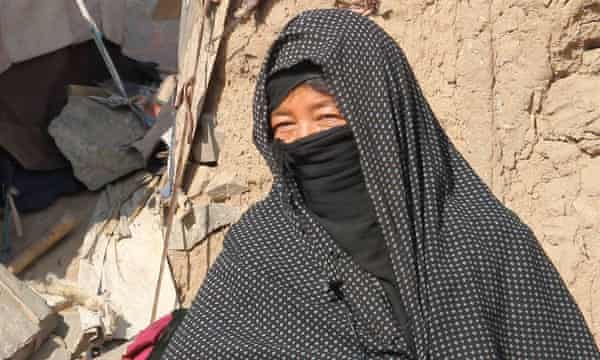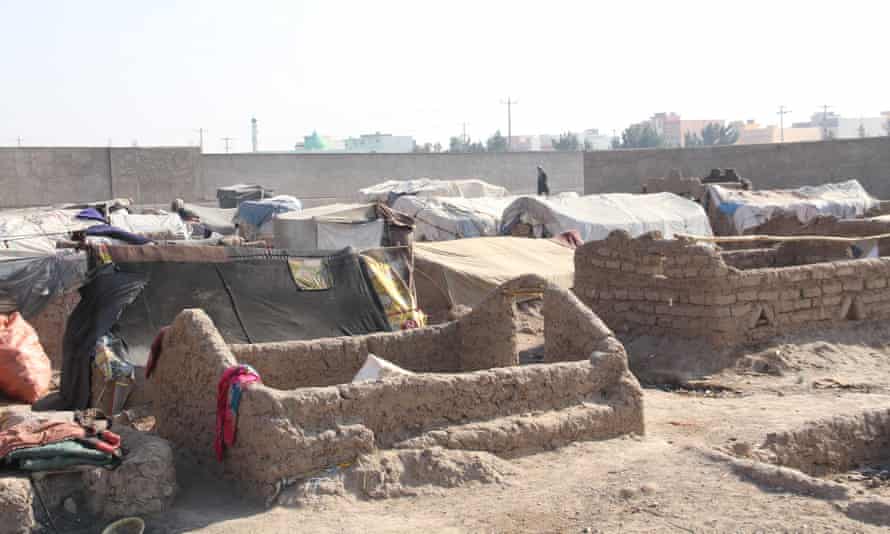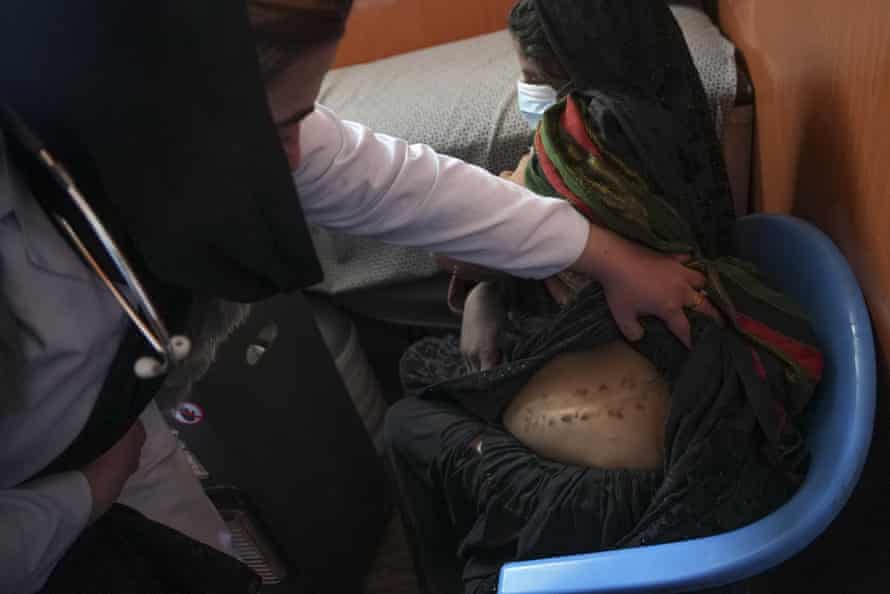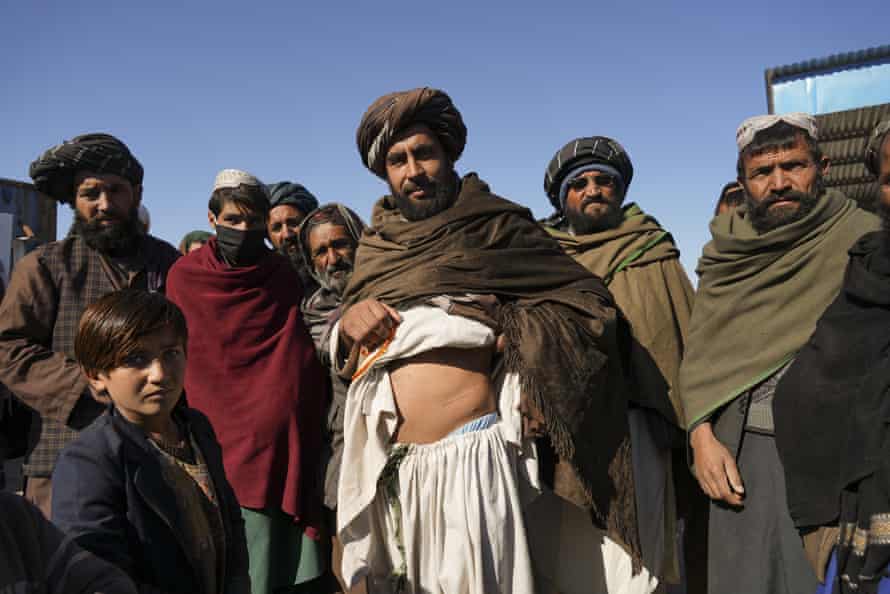With temperatures dipping below zero in western Afghanistan, Delaram Rahmati is struggling to find food for her eight children.
Since leaving the family home in the country’s Badghis province four years ago, the Rahmatis have been living in a plastic-roofed mud hut in one of Herat city’s slums. The drought made their village uninhabitable and the land unworkable. Like an estimated 3.5 million Afghans who have been forced from their homes, the Rahmatis now live in a neighborhood for internally displaced persons (IDPs).
There are no jobs. But the 50-year-old woman has to pay hospitalization costs for two of her children, one of whom is paralyzed and the other mentally ill, as well as medicine for her husband.
“I was forced to sell two of my daughters, an eight-year-old and a six-year-old,” she says. Rahmati says she sold her daughters a few months ago for 100,000 Afghanis each (about £700) to families she doesn’t know. Her daughters will stay with her until they reach puberty and then they will be given to strangers.
It is not uncommon in Afghanistan to arrange the sale of a daughter for a future marriage, but to raise her at home until it is time for her to leave. However, as youThe country’s economic crisis deepens, families report that they are giving up children at an increasingly younger age because they cannot afford to feed them.

However, selling her daughters’ futures was not the only agonizing decision Rahmati was forced to make. “Because of debts and hunger, I was forced to sell my kidney,” she tells Rukhshana Media from outside her home in Herat’s slum.
Afghanistan is on the brink of “a humanitarian crisis and economic collapse,” according to the UN. The agency’s ambassador to Afghanistan has said it is “experiencing the worst humanitarian crisis in its contemporary history.” The drought, Covid-19 and the economic sanctions imposed after the Taliban took power in August 2021 have had catastrophic consequences for the economy. Drastic increases in inflation have led to skyrocketing food prices.
The kidney trade has been growing in Afghanistan for some time. But since the Taliban took power, the price and the conditions under which the illegal trade in organs takes place has changed. The price of a kidney, which was previously between $3,500 and $4,000 (£2,600 to £3,000), has been reduced to less than $1,500 (£1,100). But the number of volunteers continues to increase.
Rahmati sold his right kidney for 150,000 Afghanis (£1,000). But her recovery from the operation has not been good and now, like her husband, she is also sick, with no money to see a doctor.
More than half of the country’s estimated 40 million people face “extreme levels of hunger, and nearly 9 million of them are at risk of famine,” according to the UN refugee agency, UNHCR. For a growing number of Afghans, selling a kidney is the only way to get money to eat.

“It has been months since we last ate rice. We hardly found bread and tea. Three nights a week, we can’t afford dinner,” says Salahuddin Taheri, who lives in the same slum as the Rahmati family.
Taheri, a 27-year-old father of four who makes enough money for five loaves of bread a day by collecting and selling recycled trash, is looking for a buyer for his kidney. “I have been asking the private hospitals in Herat for many days if they need any kidneys. I even told them that if they needed it urgently, I can sell it below the market price, but I have not received a response,” says Taheri. “I need to feed my children, I have no choice.”
In the past five years, about 250 official kidney transplants have been performed at hospitals in Herat province, and a very limited number have been from a family member who donated their organ, says Asif Kabir, an official at provincial public health. The cost of a kidney transplant is 400,000 Afghans, plus the price of the kidney, according to Kabir.
But the actual number of kidney operations may be much higher. A doctor who works in one of the hospitals where most transplants take place, who spoke on condition of anonymity, says: “Lately, the number of people who want to sell their kidney has increased in Herat and most of them live in the displaced . camps, in the slums of Herat. Clients also go to the displaced persons camps to look for a cheap kidney.”
Sayed Ashraf Sadat, a civil society activist in Herat, was a member of a delegation assigned by President Ashraf Ghani to investigate the illegal kidney trade in May 2021.

“We discovered that the hospitals were not operating according to the law. People are working at home and abroad to encourage people to sell their kidneys. These people get visas for them and send them across the border. There is more demand for kidney transplants outside of Afghanistan. Countries like Iran need kidneys and poor Afghans are forced to sell them.”
Sadat says the investigation he was a part of identified two hospitals in Herat where kidney transplant operations are being performed; one of them said he had completed 194 operations and the other said 32, but more than 500 people claimed to have sold their kidney, 100 from a single village in Herat. “This shows that the kidneys were taken out of Afghanistan,” says Sadat.
“For example, a kidney is bought for 300,000 Afghani (£2,100) inside Afghanistan, and it sells for more than £7,500 to £11,000 outside the country,” says Sadat.
“We found evidence that some are encouraged to sell their kidneys, they take them across borders, and their kidneys are sold for 200,000 to 400,000 Afghanis,” says Sadat. “It seems that the doctors are involved in the illegal trade. But unfortunately, our investigation was stopped due to the worsening security situation.”

Two months have passed since Rahmati’s kidney operation and the money has already gone to pay off medical debt. His recovery from the operation continues to go poorly.
“I am very sick. I couldn’t even walk because the wound has become infected. It is very painful,” he says, adding that the recipient of his kidney only paid the fee for the operation, two nights in hospital and the bill for his first kidney. medicine.
On the day of the transplant, Rahmati was ill and the doctors refused to operate. “I couldn’t breathe well, so the doctors took me out of the hospital bed, but I came back. I told them ‘I’m happy with my own death, but I can’t bear to see my children hungry and sick,’” she says.
Sign up for a different view with our Global Dispatch newsletter – a roundup of our top stories from around the world, recommended reading and thoughts from our team on key development and human rights issues, delivered to your inbox every two weeks :
Sign up for Global Dispatch – check your spam folder for confirmation email
www.theguardian.com
George is Digismak’s reported cum editor with 13 years of experience in Journalism